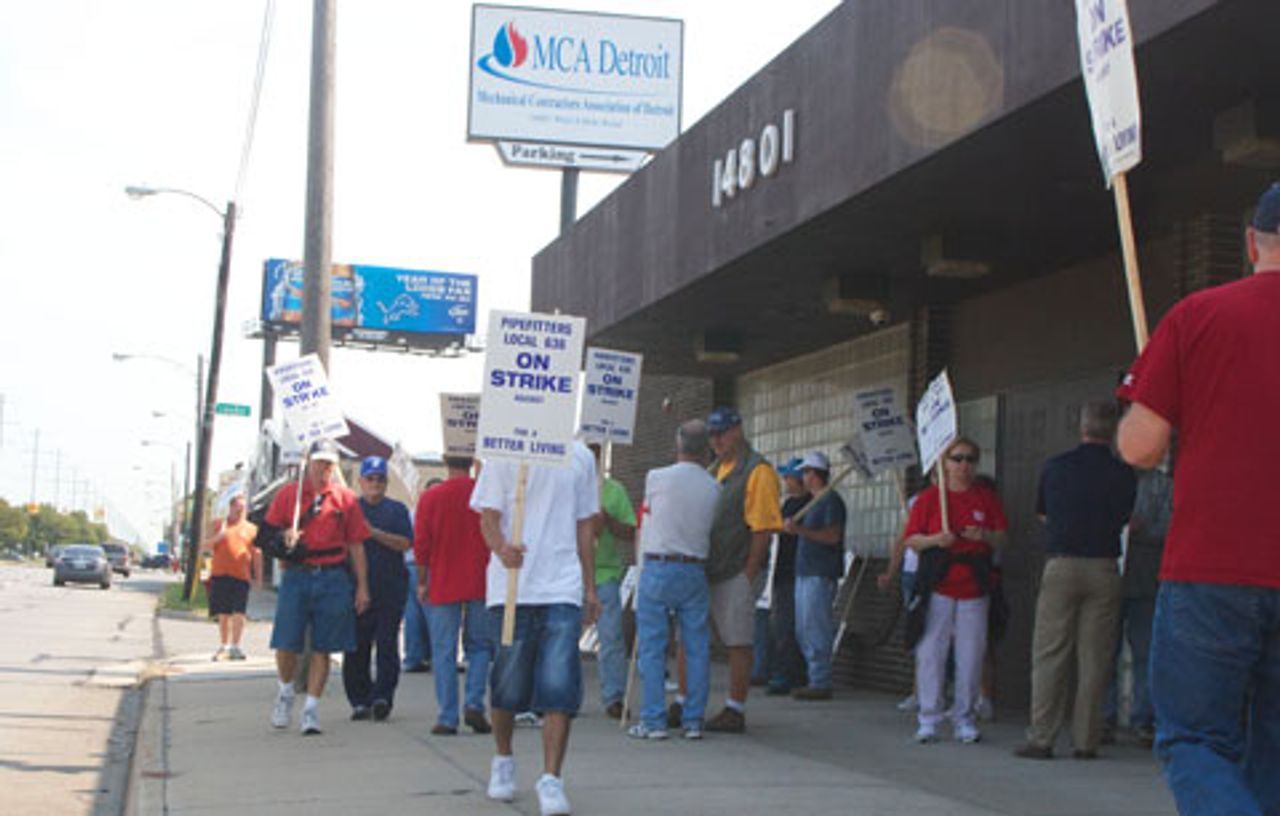 The picket line on Eight Mile Road, Detroit
The picket line on Eight Mile Road, Detroit
Members of Pipefitters Local 636 are continuing a strike begun July 9 over terms of a new labor agreement with building contractors in southeast Michigan. The 1,500 member local has been on strike since July 10, resisting contractors’ demands for a wage freeze.
The old contract with members of the Mechanical Contractors Association (MCA) expired on May 31, but Local 636 agreed to a five-week extension while negotiations continued. Pipefitters walked out in July after members unanimously voted strike authorization. The strike, however, has had a minimal impact. Some 40 contractors have signed interim agreements, whereby the union allows work to continue with the understanding that the contractor will adopt the terms of the final settlement. Other projects have continued because of no-strike clauses.
Nonstriking members are being assessed 10 percent of gross pay by the local, the money going to the Pipefitter Labor Dispute Fund.
On September 17, members and supporters of Local 636 held a spirited picket in front of the offices of the MCA on Eight Mile Road in Detroit. A World Socialist Web Site reporting team spoke to strikers and their supporters on the picket line.
Terry Gilligan, a Local 636 business representative told the WSWS, “There was an interim agreement and a lot of contractors signed. There are a few contractors that have held out and haven’t signed.
“All of our trust funds are self-administered. Money has to come off the top to keep those trust funds solvent. They are asking us to take a freeze, which means in essence taking 75 cents or a dollar off our members’ checks. We feel that work is good enough so that our members don’t have to take a cut in pay.”
“We have had very good work for the last year and a half and they are claiming ‘oh it is the economy.’ The last year and a half we have had close to full employment. We have actually got 200-300 traveler members from other locals working here in Detroit. The biggest project right now is the Marathon Oil Refinery. There is quite a bit of work waiting for that project to wind down.”
 Bryan Cox
Bryan Cox
Bryan Cox, a pipefitter with 31 years experience said, “The one percent has more money than the rest of the 99 percent. Now they are trying to take collective bargaining away. It is scary.
“Our local has one of the best apprenticeship programs in the state. They tell us we make more money than anyone in the state—well we are better because of our training.
“I don’t like the wage freeze. It is actually a pay cut. We are not keeping up with the economy.
“I see that the Canadian Auto Workers are talking about going on strike. People are starting to get tired of being pushed around.”
Bryan told the WSWS that the pipefitters had agreed to perform work for Chrysler at just 90 percent of standard wages at the time of its forced bankruptcy in 2009. “Now they are back to making profits, but they don’t want to give us our 100 percent.”
The wife of a pipefitter with 40 years experience said, “I appreciate what these guys are doing.”
She said she backed the struggle of the Chicago teachers against the attacks of Mayor Rahm Emanuel. “I am for any union that’s fighting for their rights. It is going to be a long hard battle.”
 Brant Howard
Brant Howard
Brant Howard, with 31 years experience, said, “They wanted to take everything from us. They wanted Sunday straight time, Saturday straight time. They wanted us to work 10 hour before paying time and a half. We rebuked that right away. Now we are asking for a pay raise.
“It is a strange strike. There are no-strike agreements on some of the projects, even though they haven’t signed. There are interim agreements. We have so many different types of agreements.”
Another veteran pipefitter said he supported the stand being taken by the Chicago teachers. “They want to privatize everything so they don’t have to pay the workers a decent wage. I don’t like charter schools. I have a good friend who is a teacher and he doesn’t like charters. Education is not supposed to be a money making proposition.”
